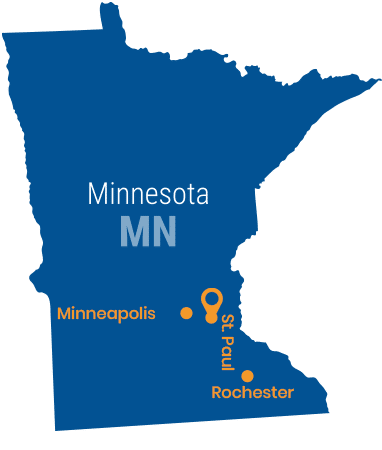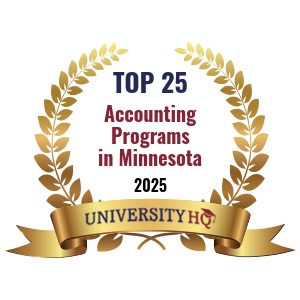What is Accounting?
Becoming a certified public accountant (CPA) in this state may differ somewhat from others, so it's important that students hoping to earn certification as CPAs learn the specific CPA requirements of the state. This is including the fact that Minnesota does not require a candidate to have yet graduated from college before sitting for the Uniform CPA Examination. You can find a full review and analysis of state policies and the rules individuals must follow here.
An accounting function is essential to almost all businesses. A small firm may have a bookkeeper or accountant handling the task, while an organization with a large finance department may have dozens of employees handling the process. In order to make informed business decisions, various streams of accounting, such as cost accounting and managerial accounting, generate numerous reports.
Accountants hail from a wide variety of backgrounds. Generally speaking, however, attention to detail is a key component in accountancy, since accountants must be able to diagnose and correct subtle errors or discrepancies in a company’s accounts. The ability to think logically is also essential, to help with problem-solving. Mathematical skills are helpful but are less important than in previous generations due to the wide availability of computers and calculators.

Featured Online Programs
Best Schools for Accounting in Minnesota
University of Minnesota-Twin Cities
Score: 84.44
- Undergraduate Tuition
- In-State: $16,488
- Out-of-State:$36,402
- Net Price: $16,730
- Acceptance Rate: 77%
- Retention Rate: 91%
- Graduation Rate: 85%
- Total Enrollment: 54,890
- Undergrad Students: 39,556
- Graduate Students: 15,334
- Grads Salary: $80,000
- Student-to-faculty: 16:1
University of Minnesota-Crookston
Score: 75.34
- Undergraduate Tuition
- In-State: $13,120
- Out-of-State:$13,120
- Net Price: $13,442
- Acceptance Rate: 58%
- Retention Rate: 77%
- Graduation Rate: 50%
- Total Enrollment: 2,518
- Undergrad Students: 2,518
- Graduate Students: N/A
- Grads Salary: $74,000
- Student-to-faculty: 17:1
St. Catherine University
Score: 74.82
- Undergraduate Tuition
- In-State: $49,758
- Out-of-State:$49,758
- Net Price: $22,357
- Acceptance Rate: 94%
- Retention Rate: 78%
- Graduation Rate: 65%
- Total Enrollment: 3,533
- Undergrad Students: 2,431
- Graduate Students: 1,102
- Grads Salary: $82,000
- Student-to-faculty: 10:1
Concordia University-Saint Paul
Score: 74.19
- Undergraduate Tuition
- In-State: $25,000
- Out-of-State:$25,000
- Net Price: $17,989
- Acceptance Rate: 75%
- Retention Rate: 67%
- Graduation Rate: 59%
- Total Enrollment: 5,854
- Undergrad Students: 3,146
- Graduate Students: 2,708
- Grads Salary: $78,000
- Student-to-faculty: 15:1
Saint Mary's University of Minnesota
Score: 73.25
- Undergraduate Tuition
- In-State: $43,160
- Out-of-State:$43,160
- Net Price: $22,518
- Acceptance Rate: 89%
- Retention Rate: 79%
- Graduation Rate: 68%
- Total Enrollment: 3,831
- Undergrad Students: 1,075
- Graduate Students: 2,756
- Grads Salary: $79,000
- Student-to-faculty: 18:1
Saint John's University
Score: 73.2
- Undergraduate Tuition
- In-State: $53,942
- Out-of-State:$53,942
- Net Price: $29,473
- Acceptance Rate: 90%
- Retention Rate: 83%
- Graduation Rate: 76%
- Total Enrollment: 1,624
- Undergrad Students: 1,481
- Graduate Students: 143
- Grads Salary: $81,000
- Student-to-faculty: 12:1
Gustavus Adolphus College
Score: 72.6
- Undergraduate Tuition
- In-State: $54,310
- Out-of-State:$54,310
- Net Price: $28,805
- Acceptance Rate: 62%
- Retention Rate: 84%
- Graduation Rate: 76%
- Total Enrollment: 1,952
- Undergrad Students: 1,952
- Graduate Students: N/A
- Grads Salary: $72,000
- Student-to-faculty: 11:1
University of Minnesota-Duluth
Score: 72.56
- Undergraduate Tuition
- In-State: $14,318
- Out-of-State:$19,762
- Net Price: $19,542
- Acceptance Rate: 82%
- Retention Rate: 81%
- Graduation Rate: 64%
- Total Enrollment: 9,350
- Undergrad Students: 8,525
- Graduate Students: 825
- Grads Salary: $73,000
- Student-to-faculty: 16:1
The College of St. Scholastica
Score: 71.92
- Undergraduate Tuition
- In-State: $40,454
- Out-of-State:$40,454
- Net Price: $23,913
- Acceptance Rate: 94%
- Retention Rate: 78%
- Graduation Rate: 63%
- Total Enrollment: 2,979
- Undergrad Students: 1,755
- Graduate Students: 1,224
- Grads Salary: $79,000
- Student-to-faculty: 10:1
Bemidji State University
Score: 71.73
- Undergraduate Tuition
- In-State: $10,164
- Out-of-State:$10,164
- Net Price: $16,349
- Acceptance Rate: 71%
- Retention Rate: 78%
- Graduation Rate: 53%
- Total Enrollment: 3,926
- Undergrad Students: 3,610
- Graduate Students: 316
- Grads Salary: $71,000
- Student-to-faculty: 16:1
Winona State University
Score: 71.56
- Undergraduate Tuition
- In-State: $10,498
- Out-of-State:$17,230
- Net Price: $18,919
- Acceptance Rate: 69%
- Retention Rate: 78%
- Graduation Rate: 61%
- Total Enrollment: 6,058
- Undergrad Students: 5,267
- Graduate Students: 791
- Grads Salary: $69,000
- Student-to-faculty: 15:1
Concordia College at Moorhead
Score: 71.36
- Undergraduate Tuition
- In-State: $30,020
- Out-of-State:$30,020
- Net Price: $25,488
- Acceptance Rate: 63%
- Retention Rate: 78%
- Graduation Rate: 72%
- Total Enrollment: 1,868
- Undergrad Students: 1,799
- Graduate Students: 69
- Grads Salary: $69,000
- Student-to-faculty: 12:1
Bethel University-Saint Paul
Score: 70.78
- Undergraduate Tuition
- In-State: $42,930
- Out-of-State:$42,930
- Net Price: $30,375
- Acceptance Rate: 91%
- Retention Rate: 87%
- Graduation Rate: 75%
- Total Enrollment: 3,521
- Undergrad Students: 2,629
- Graduate Students: 892
- Grads Salary: $77,000
- Student-to-faculty: 12:1
Rasmussen University-Minnesota
Score: 70.69
- Undergraduate Tuition
- In-State: $10,899
- Out-of-State:$10,899
- Net Price: $16,397
- Acceptance Rate: 100%
- Retention Rate: 100%
- Graduation Rate: 53%
- Total Enrollment: 8,823
- Undergrad Students: 8,054
- Graduate Students: 769
- Grads Salary: $70,000
- Student-to-faculty: 14:1
University of St. Thomas-St. Paul
Score: 70.67
- Undergraduate Tuition
- In-State: $52,284
- Out-of-State:$52,284
- Net Price: $32,637
- Acceptance Rate: 85%
- Retention Rate: 86%
- Graduation Rate: 75%
- Total Enrollment: 9,121
- Undergrad Students: 6,044
- Graduate Students: 3,077
- Grads Salary: $79,000
- Student-to-faculty: 13:1
Minnesota State University Moorhead
Score: 70.28
- Undergraduate Tuition
- In-State: $10,336
- Out-of-State:$10,336
- Net Price: $18,231
- Acceptance Rate: 53%
- Retention Rate: 72%
- Graduation Rate: 55%
- Total Enrollment: 4,410
- Undergrad Students: 3,413
- Graduate Students: 997
- Grads Salary: $67,000
- Student-to-faculty: 17:1
Augsburg University
Score: 70.04
- Undergraduate Tuition
- In-State: $43,942
- Out-of-State:$43,942
- Net Price: $24,807
- Acceptance Rate: 77%
- Retention Rate: 70%
- Graduation Rate: 52%
- Total Enrollment: 3,161
- Undergrad Students: 2,445
- Graduate Students: 716
- Grads Salary: $81,000
- Student-to-faculty: 13:1
College of Saint Benedict
Score: 69.66
- Undergraduate Tuition
- In-State: $53,884
- Out-of-State:$53,884
- Net Price: $29,720
- Acceptance Rate: 91%
- Retention Rate: 88%
- Graduation Rate: 83%
- Total Enrollment: 1,451
- Undergrad Students: 1,410
- Graduate Students: 41
- Grads Salary: $69,000
- Student-to-faculty: 11:1
Minnesota State University-Mankato
Score: 69.56
- Undergraduate Tuition
- In-State: $9,490
- Out-of-State:$18,860
- Net Price: $17,227
- Acceptance Rate: 91%
- Retention Rate: 80%
- Graduation Rate: 54%
- Total Enrollment: 14,709
- Undergrad Students: 12,897
- Graduate Students: 1,812
- Grads Salary: $73,000
- Student-to-faculty: 21:1
St. Cloud State University
Score: 69.47
- Undergraduate Tuition
- In-State: $10,117
- Out-of-State:$10,117
- Net Price: $14,648
- Acceptance Rate: 95%
- Retention Rate: 68%
- Graduation Rate: 47%
- Total Enrollment: 10,514
- Undergrad Students: 8,430
- Graduate Students: 2,084
- Grads Salary: $75,000
- Student-to-faculty: 17:1
Hamline University
Score: 68.98
- Undergraduate Tuition
- In-State: $48,311
- Out-of-State:$48,311
- Net Price: $22,759
- Acceptance Rate: 90%
- Retention Rate: 74%
- Graduation Rate: 58%
- Total Enrollment: 2,432
- Undergrad Students: 1,710
- Graduate Students: 722
- Grads Salary: $75,000
- Student-to-faculty: 13:1
Herzing University-Minneapolis
Score: 68.22
- Undergraduate Tuition
- In-State: $13,420
- Out-of-State:$13,420
- Net Price: $15,275
- Acceptance Rate: 94%
- Retention Rate: 57%
- Graduation Rate: 74%
- Total Enrollment: 752
- Undergrad Students: 748
- Graduate Students: 4
- Grads Salary: $60,000
- Student-to-faculty: 14:1
Southwest Minnesota State University
Score: 67.93
- Undergraduate Tuition
- In-State: $10,304
- Out-of-State:$10,304
- Net Price: $14,839
- Acceptance Rate: 69%
- Retention Rate: 70%
- Graduation Rate: 44%
- Total Enrollment: 7,324
- Undergrad Students: 6,884
- Graduate Students: 440
- Grads Salary: $67,000
- Student-to-faculty: 16:1
Metropolitan State University
Score: 67.33
- Undergraduate Tuition
- In-State: $9,780
- Out-of-State:$9,780
- Net Price: $18,233
- Acceptance Rate: 96%
- Retention Rate: 73%
- Graduation Rate: 38%
- Total Enrollment: 6,005
- Undergrad Students: 5,271
- Graduate Students: 734
- Grads Salary: $78,000
- Student-to-faculty: 14:1
University of Northwestern-St. Paul
Score: 64.15
- Undergraduate Tuition
- In-State: $36,830
- Out-of-State:$36,830
- Net Price: $26,779
- Acceptance Rate: 92%
- Retention Rate: 84%
- Graduation Rate: 68%
- Total Enrollment: 3,262
- Undergrad Students: 3,173
- Graduate Students: 89
- Grads Salary: $64,000
- Student-to-faculty: 15:1
Online Accounting Education in Minnesota
Here, there are different specific educational requirements, accounting courses, and rules based on whether an individual is receiving a CPA certificate or sitting for the CPA exam. For the former, the licensure requirement policy is that candidates must possess a bachelor’s degree or higher that includes at least 24 semester hours of accounting at the undergraduate or graduate level. Courses must include financial accounting, taxation, auditing, and managerial accounting.
For the latter, candidates planning their initial attempt at the exam must have successfully completed at least 150 credit hours, which includes at least 24 semester hours of accounting at the baccalaureate degree or graduate degree level and courses in financial accounting, taxation, auditing and management accounting, as well as at least 24 semester hours in undergraduate or graduate courses in business or accounting. Of these 48 hours, only six may apply to life experience or internships and this does not include a CPA review course from a company that doesn't count as school credit from the department of education or a university or business school.
Residency requirements
To take the CPA Exam in this state, the candidate must be either a resident or have regular employment in the state with an accounting firm or other organizations. Other options include working in-state to obtain qualifying work experience or planning to work in the state within three months of completing your studies and passing the CPA exam by moving there from anywhere in the U.S. or abroad.
Online Associate (AS)

An associate degree in accounting teaches students how to view accounting data and make needed changes before it is used for financial statements, forecast accounting reports, or budgets. This degree will only prepare you to work at the entry level in an office or for accounting firms. Make sure that any school you sign on to attend is an accredited school with a national or regional accrediting agency approved by the Department of Education.
Online Bachelors (BS, BAcc or B.Acy)

After you complete your general education (lower-division classes) at your educational institution, you'll be able to claim entry to an accounting program within your college or university and begin working your way toward an accounting degree. This can gain you access to higher than entry-level opportunities and prepare you for more leadership positions, whether you earn your degree through distance learning or on campus. It's important to attend a school with accreditation; you should look for a school accredited by the AACSB.
Online Masters (MS, MAcc or M.Acy)

One university offers its Master of Accounting (MAcc) at two campuses in-state. A graduate degree will let you earn all the credits you need in accounting and related subjects, such as business courses, to become a CPA. In fact, a business school or other accredited institution with accreditation from the AACSB will be able to offer a higher degree, such as an MBA with a focus in accounting which will completely fulfill your CPA license requirements. A graduate accounting degree is plenty to move your career forward, but you might also attend related courses at this level to use for continuing education credits such as those in public accounting, risk assessment, accounting information systems, financial statement analysis, and more.
Online Doctorate (PhD)
The accounting Accounting PhD programs ready doctoral students for a life devoted to research. The PhD accounting program focuses on theoretical accounting and, while you won’t need a doctorate for most accounting positions, they are useful to move ahead in academia. Again, an accredited institution is important at this level, though AACSB accreditation is not a requirement.
Minnesota CPA Exam Requirements
This state allows those who are within six months of completing a degree to apply for the Uniform CPA Examination under its Early Examination program. Once such a student application is accepted, the person may sit for the exam within three months of the date on which the educational requirements are completed. In such situations, the student has 150 days after the exam date to provide the Minnesota State Board of Accountancy (MBA) with proof of completion of the educational requirements.
Whether or not the applicant has graduated from college, he or she should visit the website of CPA Examination Services (CPAES), complete registration, and download the exam application forms. If the person has not yet graduated from college, they must ask for official college transcripts along with submitting a Certificate of Enrollment form filled out by a college representative that confirms all courses will be completed within four months of taking the exam. Those who have already graduated college must send in your official transcript showing all required courses and/or an accounting major, and both types of applicants must include a 2” x 2” photo of themselves and a check, money order or credit card number for paying the CPAES fee or fees in their application package. Mail the package to this address:
CPA Examination Services – Minnesota Coordinator
P.O. Box 198469
Nashville, TN 37219-8469
You will receive your Notice to Schedule (NTS) the Uniform CPA Examination from the National Association of State Boards of Accountancy (NASBA). The NTS arrives as per the terms of your instructions either via email, fax, or regular mail. When you receive the NTS, visit the Prometric website and schedule the exam at a nearby location. You should plan to arrive at the test center at least one hour prior to the start of the first exam in order to make sure you are on time and have extra time to get through Prometric security.
You can find your scores online just 48 hours after taking the exam. You will also receive a copy of your score in the mail.
- Exam sections
The CPA Exam consists of four sections, each of which sits for four hours, for a total of 16 hours. The sections are Regulation, Financial Accounting and Reporting, Auditing and Attestation and Business Environment and Concepts. You may complete these sections in any order and take them in the same testing window. However, you cannot repeat a test during the same testing window. You must earn a score of at least 75 in each section to earn a passing score on the exam.
Continuing Professional Education (CPE) Requirements
To maintain CPA certification, CPAs are required to have 120 hours of continuing professional education (CPE) every three years, with a minimum of 20 hours completed each year. CPE hours cannot carry over to the next three-year period.
Other requirements include:
- Eight CPE hours in behavioral or regulatory ethics
- A maximum of 60 CPE hours coming from lecturing or instruction
- A maximum of 60 CPE hours derived from publishing or serving as author
- A minimum of 24 CPE hours spent in instructor-led training
- A maximum of 24 CPE hours coming from personal development
- A minimum of 72 CPE hours must come from an approved sponsor.
You should keep all records relating to CPE hours for at least five years.
Such documentation includes:
- Attendance dates
- Program name
- Program content
- Program location
- Number of CPE hours
- Contact info for sponsor
- Detailed copy of the program agenda
- Program presenter and developer biography
- Your statement attesting to how this program aided your professional competence.
Become an Accountant in Minnesota
Before starting the experience requirements with any of the acceptable business organizations, you must pass the American Institute of Certified Public Accountants (AICPA)’s Home Study Course on Professional Ethics.
You must complete one year, or 2,000 hours, of accounting experience before applying for full licensure. The experience requirements cannot take less than one year and longer than three years to complete.
Candidates must provide the following types of service:
- Accounting - Cost Accounting
- Attestation
- Consulting
- Taxation
- Financial Advisory
- Compilation
- Management Advisory
While gaining experience, the candidate must work in either industry, government, public practice or academia. A licensed CPA must provide verification of the work done. This supervising CPA must fill out the CPA Experience Verification Form, which is submitted with the application for licensure.
Getting Your CPA License in Minnesota
Once you have completed your education, passed the Uniform CPA Examination and finished your experience requirements, you may apply for CPA licensure/certification. Start the process by downloading and completing the Application for Minnesota CPA Certificate. Along with the completed CPA Verification Form, give the three personal reference forms found in the packet to the people you choose as personal references. The references mail the forms directly to the State Board of Accountancy. Include a college transcript verifying completion of the 150 semester hours needed from an accredited school. Get in touch with the AICPA to send documentation proving you passed their ethics exam directly to the Board. Send a check in the amount of $150 to the MBA.
Mail the completed packet to:
Minnesota Board of Accountancy
85 East Seventh Place
Suite 125
St. Paul, MN 55101-2143
The Board's Exam and Credentialing Committee reviews the documents and contacts the applicant when the certificate is approved. Once you receive certification, you may call yourself a CPA.
Search Programs Offering Accounting Majors
- Reciprocal CPA licenses
If you are licensed in another state with qualifications equivalent to those in Minnesota, you may receive a reciprocal CPA certificate. Currently, in the United States or its territories only the Virgin Islands is not considered equivalent. The state does not require those holding a valid out-of-state CPA license to apply for certification or even notify the Board before beginning to practice. However, if the license is from a non-equivalent area, you may receive a state certificate if you meet the educational, examination and experience requirements of Minnesota. The application requirements are the same as for those seeking regular CPA certification in the state, except that instead of completing the Application for Minnesota CPA Certificate, you must complete the Application for Minnesota CPA Certificate by Non-Minnesota CPA Examination Candidate. You must also complete the Authorization for Interstate Exchange of Information and Certificate Information, which is included in the application packet. Send this form to the board in the state holding your license. Mail the rest of the application to the MBA.
Potential Careers for Accounting Graduates
Minnesota Average Accountant Salary
Minnesota’s tax laws and regulations are very business friendly, leading the state to establish itself as a major player in attracting nationally profitable corporations like Target, Best Buy, United Health, and 3M. This makes accounting one of the fastest rising jobs in the state since these businesses need to employ accountants, auditors, and financial managers to keep things running smoothly. Job growth is expected to hit 4% by 2024.
| City | Annual Median Wage |
|---|---|
| Duluth | $79,440 |
| St. Cloud | $82,640 |
| Minneapolis | $89,480 |
| Rochester | $87,840 |
| Entry Level | Mid Career | Late Career |
|---|---|---|
| $51,240 | $78,220 | $100,470 |
- Minnesota Average Cost Estimator Salary: $52,600
- Minnesota Average Auditor Salary: $56,900
- Minnesota Average Budget Analyst Salary: $62,100
- Minnesota Average Credit Analyst Salary: $56,900
- Minnesota Average Financial Analyst Salary: $60,200
- Minnesota Average Personal Financial Advisor Salary: $73,500
- Minnesota Average Financial Examiner Salary: $65,000
- Minnesota Average Tax Examiner, Collector, or Revenue Agent Salary: -
- Minnesota Average Tax Preparer Salary: $42,500
- Minnesota Average Actuary Salary: $89,200
- Minnesota Average Forensic Science Technician Salary: $72,800
- Minnesota Average Payroll and Timekeeping Clerk Salary: $39,300
Minnesota Accounting Frequently Asked Questions
Can I earn an online accounting degree from a Minnesota university or college?
Colleges and universities in Minnesota offer several online degree programs, with the content in the online version being just as rigorous as the traditional coursework. Some programs do have one big difference: that students can opt to take enough courses to graduate early or in two years. While nearly all schools allow part-time attendance, not all offer accelerated programs.
What is the average annual salary of an accountant in Minnesota?
Depending on your education and level of experience, you should expect to earn a little more than $54,000 as an accountant. Because of the work you’ll be doing as you create new cash-flow reports, maintain balance sheets, and work on billing; your level of experience will be valued from the very beginning of your career.
How Many accounting positions are available in this state?
The May, 2019 State Occupational Employment and Wage Estimates reported that 171,550 accounting positions were filled by accountants and professionals working in accounting-related positions in the state. This included financial operations professionals as well. Their annual mean wage was $75,940, which, again, depends on education and experience.
If I earn an associate degree in accounting (bookkeeping), can I work as an accountant?
Working in the accounting field with an associate degree, your biggest responsibility will be to assist full accountants in their daily tasks. For instance, you may be hired as a client billing specialist, which means you’ll handle duties related to billing and you will be the primary contact between the company and attorneys, agency clients, and others. Working in an entry-level position prepares you to return to school to earn a bachelor’s in accounting.
Sources:
- https://www.mncpa.org/becoming-a-cpa/process.aspx
- https://www.payscale.com/research/US/Job=Accountant/Salary/0225ed78/Minneapolis-MN
- https://www.bls.gov/oes/current/oes_mn.htm
- https://www.minnesota.edu/programs-and-degrees/accounting-programs
- https://www.indeed.com/q-Accounting-l-Minneapolis,-MN-jobs.html
Search All Programs


























